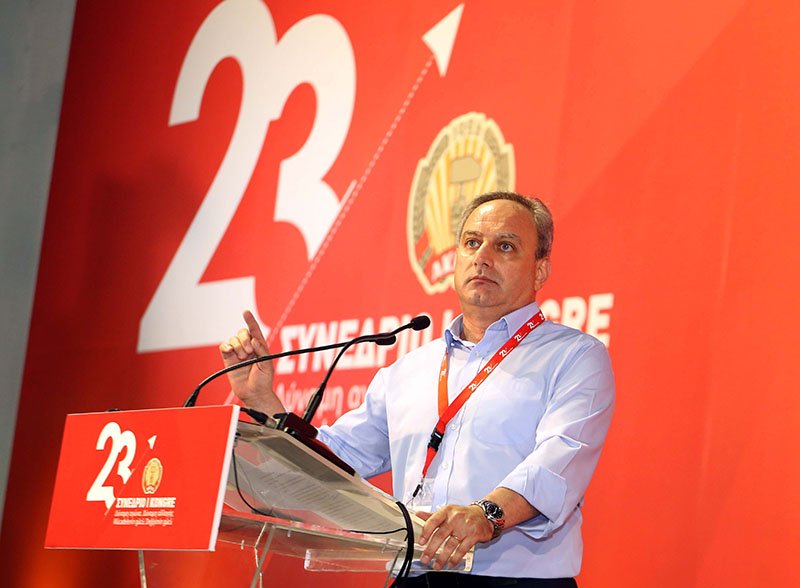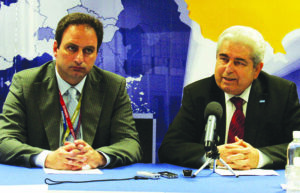In the new Akel leader, THEO PANAYIDES finds a true believer in changing the world who has happily spent his life in politics, despite it losing its charm
The headquarters of Akel in Nicosia is showing its age a bit. Its location is unimpeachable, perched on Ezekias Papaioannou street (Mr Papaioannou was the party’s longest-serving general secretary, from 1949 till his death in 1988) next to party newspaper Haravgi – but the corridors are narrow, and the waiting room surprisingly small. The overall vibe is cosy, non-corporate. Visitors aren’t required to sign in, or have their bags checked; it almost feels like anyone could jump into a lift and head upstairs to the long, roomy office belonging to Stefanos Stefanou – the new general secretary, since taking over from Andros Kyprianou last month.
He’s 56, with intense green eyes, a prominent nose and a hard, metallic voice, honed through decades of having to shout over other people – or making sure other people didn’t shout over him – in political arguments. He’s initially a bit impatient, the brisk demeanour of a man ploughing through meetings, but relaxes as the interview goes on; by the end, he’s even recalling the practical jokes he used to play on other young Akelites during his time in Edon, the party’s youth wing. (What kind of jokes? I can’t say, “if I did, they’d chuck me out!” he replies, and laughs uproariously.) That said, he’s too much the politician to go off-message, fending off loaded questions with suitably all-purpose answers.
Does Akel need to change fundamentally in order to move forward?
“No. What we’re saying is that Akel must invest in the character and countenance which it has built up over many decades, which have made it a party of the Left with mass appeal.” It must remain “open to society, always meeting the challenges of today, without getting bogged down in yesterday, with an eye to tomorrow”.

“The vision is there,” replies Stefanou stubbornly. “And my faith in the ideology – in Marxism – is also there, an ideology I’ve studied extensively.” After all, he notes, “it’s not a dogma, it’s a plan for action”, which is why it can evolve with the times – then directs me to the 11th thesis in Marx’s Theses on Feuerbach: “Philosophers have hitherto only interpreted the world in various ways; the point is to change it”.
He’s a true believer, all right – and indeed, unlike many politicians who make a pretence of having a career (usually law) outside politics, he’s never done anything else, nor has he strayed from the party. I ask for the experiences which he feels have shaped his life – and they’re all related to his rise through the ranks, first his 12 years at Edon (the last six, ending in 2001, as its general secretary), then seven years as advisor to Demetris Christofias when the latter was president of the House of Representatives – then, from 2008 when Christofias became president of the Republic, his five years as government spokesman “in a government that came under incredible pressure”. Indeed, he recalls bitterly, “from Mari onwards, the pressure went far beyond any sense of political ethos… The opposition was out of control, it was just a constant, offensive demolition”.
Well, but Mari – the massive explosion that killed 13 people in 2011 – was one of those once-in-a-lifetime disasters. An outcry was only natural.
“No,” replies Stefanou – and the voice grows harder and measurably louder, the authoritative tone that’s served him well in legislature back-and-forths and TV studios, “it was not at all natural. This was not an outcry, this was a demolition. Such things happen all over the world, it might not be often but they do happen”. He cites a case in Finland, where an ammunition dump apparently exploded next to a hospital – yet the Finnish government at the time wasn’t attacked with such virulent ferocity, never mind “blaming everything on the president of the Republic, as if he’d been in charge of the storeroom!”. He and Christofias were close, he tells me; even those who disagreed with him on every conceivable issue had to admit he was “very human”. The president was devastated by the loss of life, “he felt very bad – and of course you feel twice as bad when they call you a murderer. A man for whom even running over a cat in the street was too much!… He took this thing with him to the grave,” adds Stefanou sombrely, “and I think it had a very bad effect on his health too. I’m convinced of that, knowing him as well as I did”.

His working-class credentials are impeccable. His dad was an ironworker, his mum an occasional seamstress when money was tight; Stefanos himself (the youngest of three, and the only boy) picked up some surprising skills along the way – he’s a pretty good welder, and can tie reinforcing steel bars together on a construction site – and was always doing repairs and DIY around the house, when he still had free time. The family were also “political, and party-political”; Dad was solidly Akel, and locally active – and of course the times were political too, Stefanou’s childhood spanning the excesses of Eoka B, the coup itself (his father was briefly arrested), fleeing their village during the invasion, above all the “very radicalised” years after 1974. He recalls turbulent gatherings with scores of people trying to find out the latest on the Cyprus problem, tumultuous rallies, stirring patriotic concerts by Mikis Theodorakis – “then they brought Theodorakis to Akel to give a talk, I remember it so vividly. All these things put you on a path to politics”.
He was president of his high school, president of the Cypriot students’ association at university – in Bulgaria at the tail-end of Communism, though it doesn’t seem to have dampened his enthusiasm – then came Edon, and the rest is history. That said, it’s a hard, rather dreary kind of life, seven days a week spent in meetings of one sort or another (there’s a confab with a high-powered ambassador coming up, once my hour is over), lending his presence to memorial services, cultural events, talks to the party faithful. Sometimes, on a Sunday, he’ll happen to have some free time, he admits wryly – and immediately wonders if he might be forgetting something.
Doesn’t it get a bit tedious? “It’s part of our life,” shrugs Stefanou. His wife Georgia is used to it – and indeed they’re a team, married for the past 30 years (they have two daughters); she’s not just his support, he says loyally, she’s a valued friend and advisor. How did they meet? At the Edon summer camp, he replies with a chuckle – “Where else?”. There’s a tribal aspect to being in Akel, the party newspaper next to the party headquarters, the young people going to the same summer camp. Stefanou used to be a footballer in his youth, actually a very good one (he spent two years – 1982-84 – with the national Under-21 team). What position did he play? “Being a hardcore leftist,” he quips, “I played at left-back. And left-footed!”. It’s a joke but it speaks to something true, the lure of ideological purity; that’s why it’s funny.
A picture of the man is emerging: a working-class lad, a former athlete, fond of rock music, good with his hands, maybe a bit of an attack dog politically – but young Stefanos didn’t just play football and win elections, he also read voraciously and imbibed a certain high-minded, idealistic worldview. (He still tries to read when he can, mostly historical novels and political tomes; on his desk is a Greek translation of Les capitalismes à l’épreuve de la pandémie [‘Capitalism Under the Ordeal of the Pandemic’] by Robert Boyer.) That’s the other reason why being in politics can seem rather dreary – not just the day-to-day grind of speeches and meetings but the prosaic nature of the work as a whole, especially in Cyprus. “I regret that politics has lost its charm,” he tells me, “and become mass-produced”. One of his two political heroes – rather predictably, but still – is Che Guevara (the other is Nelson Mandela) and, though he doesn’t put much stock in motivational quotes, he’s always liked Che’s wildly romantic motto: “Be realistic, demand the impossible!”.
The actual reality of politics is different, alas – though Akel’s stance on the Cyprus problem has a touch of Che’s perverse idealism, doubling down on a bi-zonal bicommunal federation even as it’s clear the Turkish side isn’t interested. (Then again, no party has a workable stance on the Cyprus problem.) It actually feels a little strange talking politics after a year when the government has mostly been ruling by decree – and indeed the pandemic has successfully eluded the usual way of doing things. Akel are pro-vaccination while also deploring the divisions being sown by the government. They tabled 18 proposals last year, covering hospital preparedness and public health in general – but there was never any thought, for instance, of anyone from the party speaking at the recent street protest against the SafePass, nor were they invited. Stefanou is the head of a big mainstream party, for all the talk of radicalism and changing the world.
Yet he claims to find something more in what is, after all, his life’s work – and one of his major goals in the new job, he says, is for Akel to regain “the moral advantage” it used to have: “At some point we lost it and we have to recover it, investing once again in the values and ideals of the Left”. Some may oppose his ideology, he says rather grandly, “but I think, until recently, everyone would agree that the Left is clean”. This moral high ground is perhaps a case of playing politics, given the corruption allegations hurled against the government, yet he seems pretty earnest about it; he even muses – unexpectedly, for a hard-nosed career politician – on how much he loved Gulliver’s Travels as a kid, especially Gulliver’s lesser-known voyage to the Land of the Houyhnhnms, a noble race of talking horses. In the end, the ideal is perhaps “a society based on feelings of serenity, peace, co-operation and kindness”.
Stefanou’s assistant looks at her watch; the high-powered ambassador is presumably almost here. I recall something he said earlier, that ideals are all very well but actions mean everything: “Politics isn’t judged by intentions and declarations, it’s judged by actions”. I assume he’ll get plenty of time to prove his worth; Akel has only had three previous general secretaries in the past 72 years. Meanwhile I decide to take the stairs down to the ground floor, the walls adorned with thematically appropriate paintings, all of a certain age. I stop at the landing and admire the aforementioned Che, rendered in soft blacks and yellows: a slim bearded figure, sipping a drink – probably mate, or whatever they drink in those parts – and thinking about the revolution.






Click here to change your cookie preferences